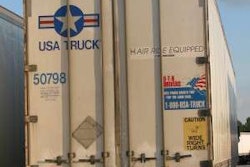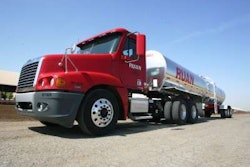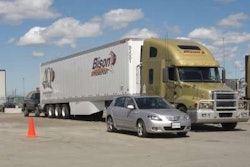Each week, McMahon Transport Group – a Lockport, Ill.-based company with 16 tractors and 42 employees – delivers about six million gallons of fuel to more than 400 gas stations in the Chicago area.
“We move a lot of volume for the amount of trucks and drivers we have,” says Jim McMahon, vice president.
Powering this highly efficient operation is a software system, Digital Fuel Solutions, that McMahon Transport created to streamline communications with its customers – fuel distributors and gas station owners.
The gasoline industry uses sophisticated information systems to manage the flow of gasoline from pipelines to terminals. But from the terminals to gas stations, information typically flows manually via phone, pencil and paper. To order a load of gas, a station owner will call a fuel distributor, who in turn will call a fuel hauler.
Besides its inefficiencies, a manual process for exchanging information is prone to errors, especially in forecasting delivery amounts. Fuel haulers need a 24-hour notice for delivery. Stations can get an inventory reading at any time, but they don’t always have the data to forecast usage for the next 24 hours to determine an order quantity. A store owner that makes a bad estimate could order too much gasoline and cause the fuel hauler to overfill an underground tank.
“It gets really tricky when you get a station that turns a large volume but has small tank sizes,” says John McMahon, vice president.
For years, McMahon Transport has managed inventories for many of its gas station customers. In times past, the company was calling the stations to get inventory readings to forecast demand and calculate delivery quantities.
About five years ago, John McMahon built a modem-based communications system to capture inventory readings from stations’ tank gauges. The system also could call stations automatically and have the person who answers physically enter their inventory over the phone.
Automating the capture of information from gas stations solved only part of the communications challenge. Everything else – from scheduling deliveries to managing drivers and billing customers – was manual and time-consuming.
Doing it themselves
In 1998, the McMahons hired programmers to develop software to simplify the company’s daily fuel delivery operations. The first software package was built using Microsoft Access.
After developing several more versions of this software in Access, the company changed platforms. In April 2007, McMahon Transport went live with Digital Fuel Solutions (www.digitalfuelsolutions.com), a Web-based system developed using Microsoft SQL Server. The company designed Digital Fuel Solutions to be a communications tool and clearinghouse of information for station owners, fuel distributors and fuel haulers.
When a station owner logs into Digital Fuel Solutions, the system shows the current inventory readings and all previous orders and deliveries of gas. Station owners can order a delivery online or use a patent-pending feature called the Load Generator to automatically create optimal loads based on predetermined parameters.
Fuel distributors can use the software to schedule deliveries via e-mail and fax with McMahon Transport and other fuel haulers. Distributors also can manage their accounts with station owners and stop certain deliveries from being made to a station as a result of credit problems.
Most of the features in the software were designed specifically for the fuel hauler – load scheduling, driver communications, billing, etc. Since implementing the system, McMahon Transport has improved its billing accuracy. With its previous system, the company was underbilling customers $1,500 a week. “Now we bill in 18 minutes a week,” John McMahon says. “It is all automated.”
Other benefits of the system are difficult to measure. “You cannot put a number on the customer service benefits and organization,” John McMahon says. “We can use this as a tool to get more trucking. We offer it to distributors for free.”
McMahon Transport also is saving $3,700 a week as a result of reducing its number of dispatchers from five to two. Each dispatcher works a 12-hour shift, but their actual working time is four hours, John McMahon says. “I could handle double the amount of work.”
By all indications, the company will have more opportunities to add more work without more overhead. Many of the major oil companies are exiting the trucking business as they sell off retail gas stations, John McMahon says.
“The gasoline industry is being shaken up a lot,” he says. “Smaller companies and distributors have gained new business, and the new owners are looking for haulers.”
Going commercial
Seeing the software’s benefits to its own business, the McMahon brothers decided to market Digital Fuel Solutions to other fuel haulers. They initially hesitated since the software created a competitive advantage, but ultimately they decided the opportunities far outweighed the risks.
In July 2007, distributor Texor Petroleum – a Riverside, Ill.-based division of World Fuel Services – began to use the software for itself and to conduct business with McMahon Transport Barry Trilla, senior vice president of Texor, has “suggested” that other fuel haulers that work with Texor should use the same software. “Since I need it, if you like to haul for us, you need to be on it as well,” Trilla says.
In April 2008, McMahon Transport sold the system to its first fuel hauler customer, Excel Petroleum Transport, which operates 12 trucks in a 24-hour operation. “I can’t emphasize enough how much this has streamlined dispatching,” says Kevin Bulman, president of the Rockdale, Ill.-based company. The software has enabled Excel to reduce its payroll and virtually eliminate service failures, and because the system is Web-based, Bulman can monitor his business from anywhere.
To date, three fuel distributors and seven fuel haulers with operations similar to McMahon Transport have signed on to Digital Fuel Solutions.
McMahon Transport is offering Digital Fuel Solutions to fuel haulers for a one-time charge starting at $5,000 and $500 a month for the base program. The cost of the system can be justified primarily by reducing the headcount of dispatchers, John McMahon says. “They can handle large volumes of work with a lot less people.”
The owners currently are talking to an outside marketing company to help roll out the software on a larger scale and have hired a director of sales for Digital Fuel Solutions.
“The unique part is that (the software) is built around user friendliness,” John McMahon says. “In one day, you can be up and running on the system.”











